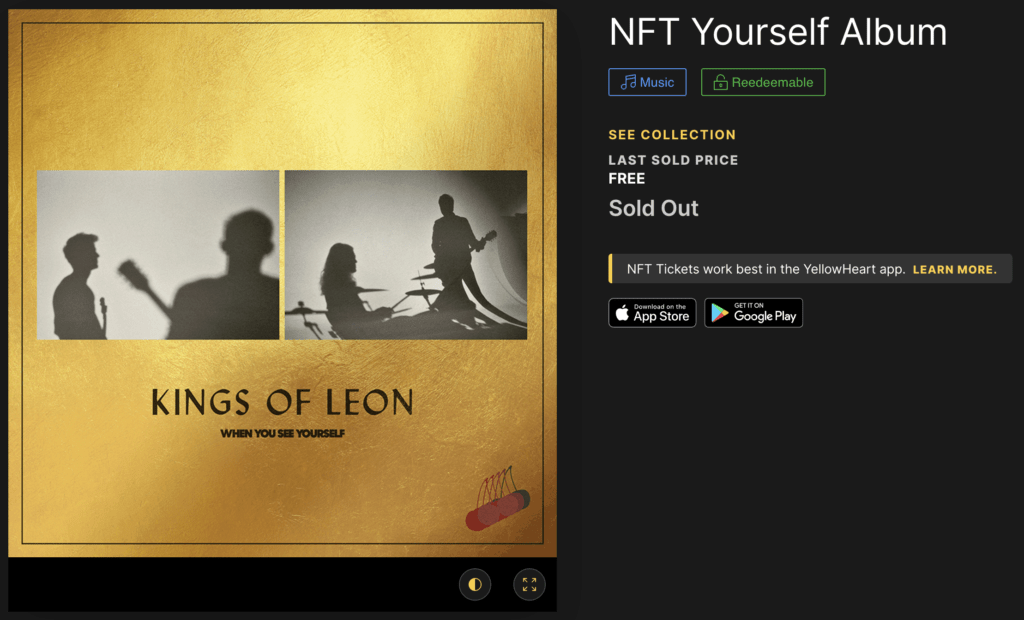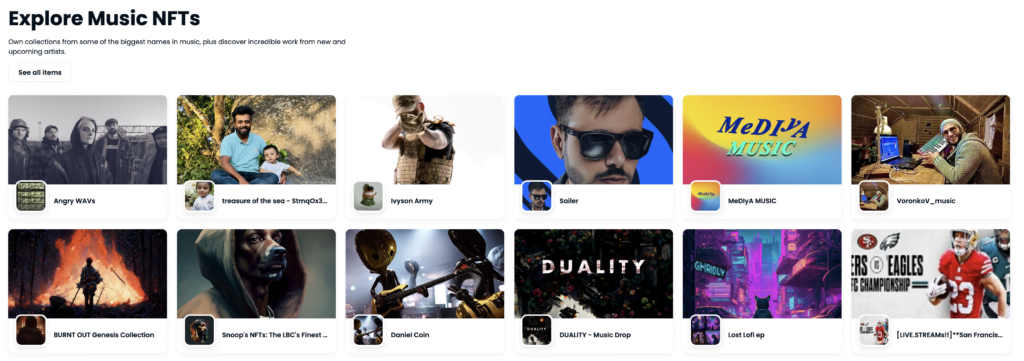The meteoric rise of NFT music has ushered in a new era of digital innovation, disrupting traditional industries and offering unparalleled opportunities for artists. Among these industries, music has emerged as a primary benefactor of this groundbreaking technology. “Unleashing the Power of NFT Music: A Definitive Guide to NFTs and the Music Industry” explores the transformative potential of NFT music, providing insights into its impact on the ever-changing musical landscape.
NFT music leverages non-fungible tokens, unique digital assets stored on blockchain networks that signify ownership, authenticity, and provenance of a specific item or work. Unlike cryptocurrencies, such as Bitcoin or Ethereum, non-fungible tokens cannot be exchanged on a one-to-one basis due to their distinct value and characteristics.
The influence of NFT music on the industry has been extraordinary, as it grants artists increased autonomy and control over their work, unlocks innovative revenue streams, and cultivates unprecedented fan engagement. As this technology continues to mature, the implications for the music industry are both captivating and extensive.
This article is designed to be an all-encompassing guide for musicians, industry professionals, and enthusiasts interested in the power and potential of NFT music. We will delve into the essentials of non-fungible tokens, their application within the music industry, and how to capitalize on their potential to revolutionize the creative landscape.
Embark with us on this exhilarating journey through the dynamic world of NFT music, and uncover how this cutting-edge technology is reimagining the way we create, share, and experience music.
History of NFTs in Music
The history of NFT music can be traced back to the early days of blockchain technology when artists and innovators began to recognize the potential of non-fungible tokens to revolutionize the creative space. In the past few years, NFT music has rapidly gained traction as musicians have adopted this technology to forge new pathways for revenue generation, fan engagement, and artistic expression.

This wave of digital transformation has seen high-profile musicians and up-and-coming artists alike embracing NFT music as a means to redefine the value and distribution of their work. From the groundbreaking NFT album sales by artists like Kings of Leon, to unique audio-visual collectibles and virtual concerts, NFT music has come a long way, carving out a niche for itself in the broader cultural zeitgeist. As the technology and its applications continue to evolve, the history of NFT music stands as a testament to the power of innovation and the limitless possibilities that lie ahead for the music industry.
How NFTs are transforming the music industry
NFT music is profoundly transforming the music industry, reshaping the way artists, fans, and industry professionals interact with and consume music. This disruptive force is empowering musicians with unprecedented control over their creations, enabling them to monetize their work directly and bypass traditional intermediaries.
NFT music also paves the way for innovative revenue streams, such as limited edition digital collectibles, virtual concert experiences, and exclusive access to unreleased material. These new opportunities are not only lucrative for artists but also foster deeper connections with their fans, who can now own a unique piece of their favorite musician’s work.
Moreover, NFT music helps tackle the issue of piracy and copyright infringement by providing a transparent and immutable record of ownership on the blockchain. NFT music is poised to redefine the music industry, unlocking a world of creative possibilities and driving a new era of artistic expression and collaboration.
Creating and selling NFT music
Creating and selling NFT music has become an increasingly popular endeavor for musicians and artists, offering them an alternative platform to monetize their work and connect with fans. The process begins with the artist creating a digital asset, such as an audio track, album, or multimedia experience. This digital creation is then minted as a unique non-fungible token on a blockchain platform, ensuring its authenticity and rarity.

Once the NFT music is minted, it can be listed on various NFT marketplaces, such as OpenSea, Rarible, or Foundation, where potential buyers can discover and bid on these exclusive pieces. The sale of NFT music can take various forms, including auctions, fixed-price sales, or even complex royalty structures that allow artists to receive a percentage of the proceeds from future resales.
Challenges and controversies
While NFT music has generated excitement and new opportunities within the music industry, it has not been without its challenges and controversies. One of the most pressing concerns is the environmental impact of minting and trading NFTs, as the energy consumption associated with blockchain technology can contribute to a significant carbon footprint. This issue has led some artists and fans to question the sustainability of NFT music and seek out eco-friendly alternatives.
Another challenge is the potential for fraudulent activities, such as unauthorized minting and selling of copyrighted works, which raises questions about intellectual property rights and protection. Additionally, the rapid rise in popularity of NFT music has sparked debates about the potential for market speculation and the formation of digital asset bubbles.
As the industry navigates these challenges, it is essential for musicians, collectors, and platforms to work together to address these concerns and ensure the responsible growth and development of NFT music within the global music ecosystem.

The future of NFT music
The future of NFT music is poised to be as dynamic and exciting as the technology that underpins it. As more artists and industry professionals embrace NFTs, we can expect a proliferation of innovative use cases and collaborations that push the boundaries of creativity and fan engagement. NFT music is likely to evolve beyond simple digital collectibles, incorporating elements such as virtual reality, interactive experiences, and metaverse integrations, which will further redefine the way we interact with and consume music.
Additionally, as blockchain technology advances, environmentally friendly solutions, and more efficient consensus mechanisms will help mitigate concerns surrounding the ecological impact of NFT music. The development of new platforms and marketplaces catering specifically to musicians will also play a significant role in shaping the future landscape of NFT music, offering artists tailored tools and resources to maximize their creative potential.
Ultimately, the future of NFT music hinges on the continued collaboration and innovation of artists, industry professionals, and technology pioneers, working together to harness the transformative power of non-fungible tokens and usher in a new era of musical expression.
Conclusion
In conclusion, NFT music has emerged as a powerful force within the music industry, offering artists, fans, and professionals a plethora of new opportunities to explore creative expression, collaboration, and revenue generation.
While the technology has faced its share of challenges and controversies, the potential benefits far outweigh these concerns, as NFT music continues to evolve and adapt to the changing landscape. The future of NFT music is filled with promise, as innovations in blockchain technology and the expanding metaverse pave the way for unprecedented artistic experiences and unique ways of connecting with fans.
As we embrace this new era, it is crucial for all stakeholders to work together to foster the responsible growth and development of NFT music, ensuring that its full potential is realized and that it becomes an integral part of the global music ecosystem.
Author

Passionate Web3 and NFT explorer, navigating the complex narrative of digital assets.




